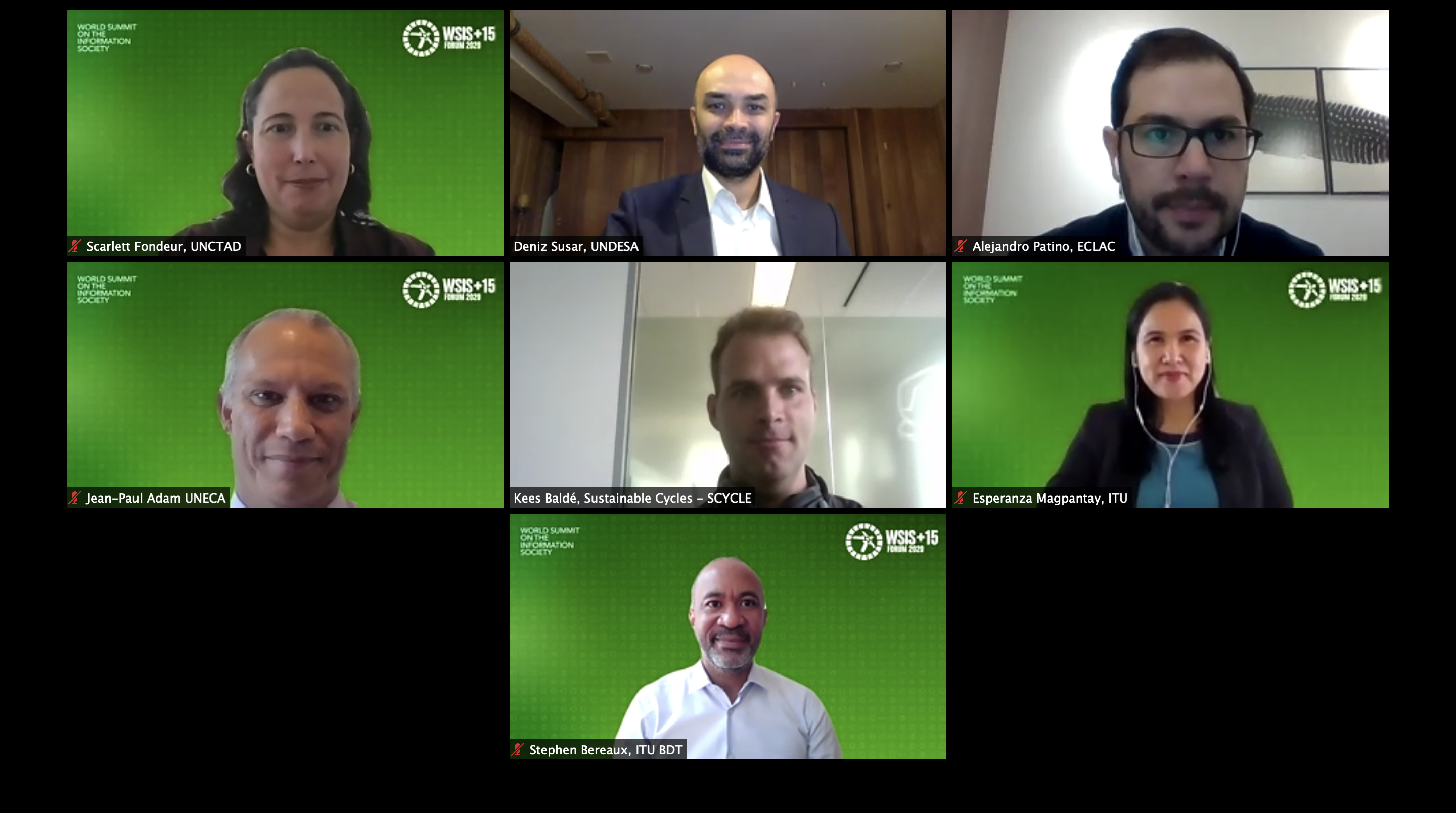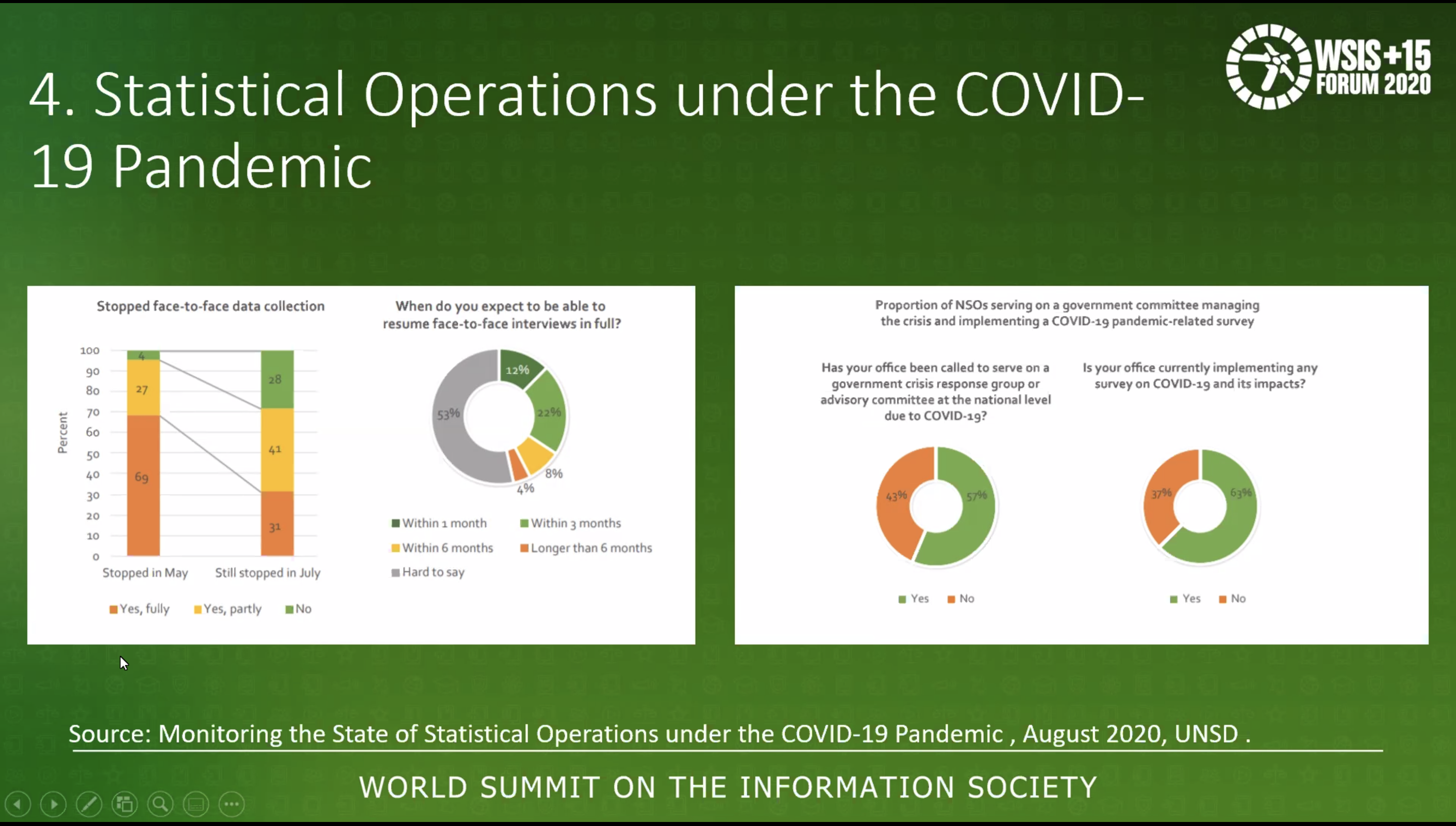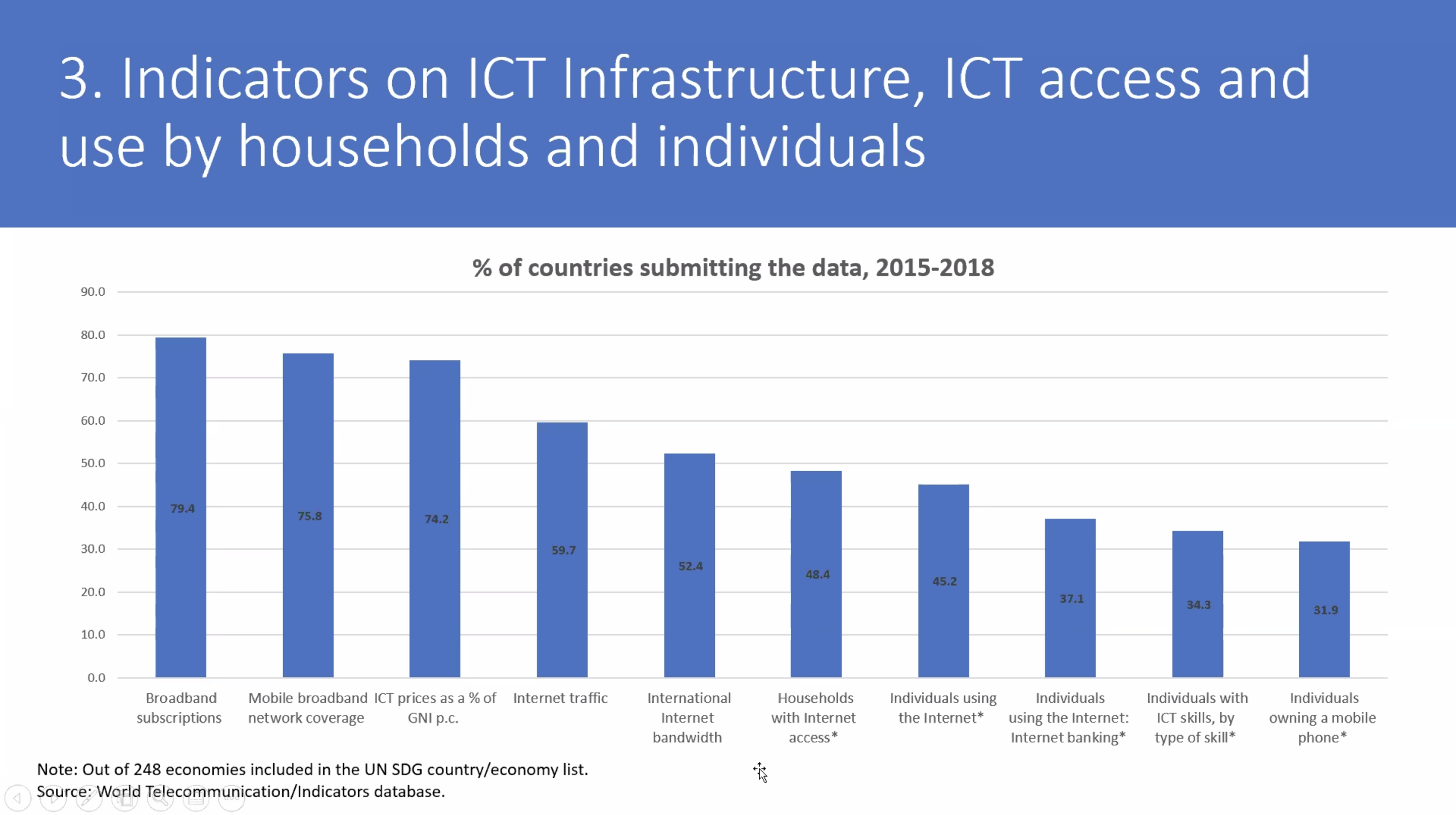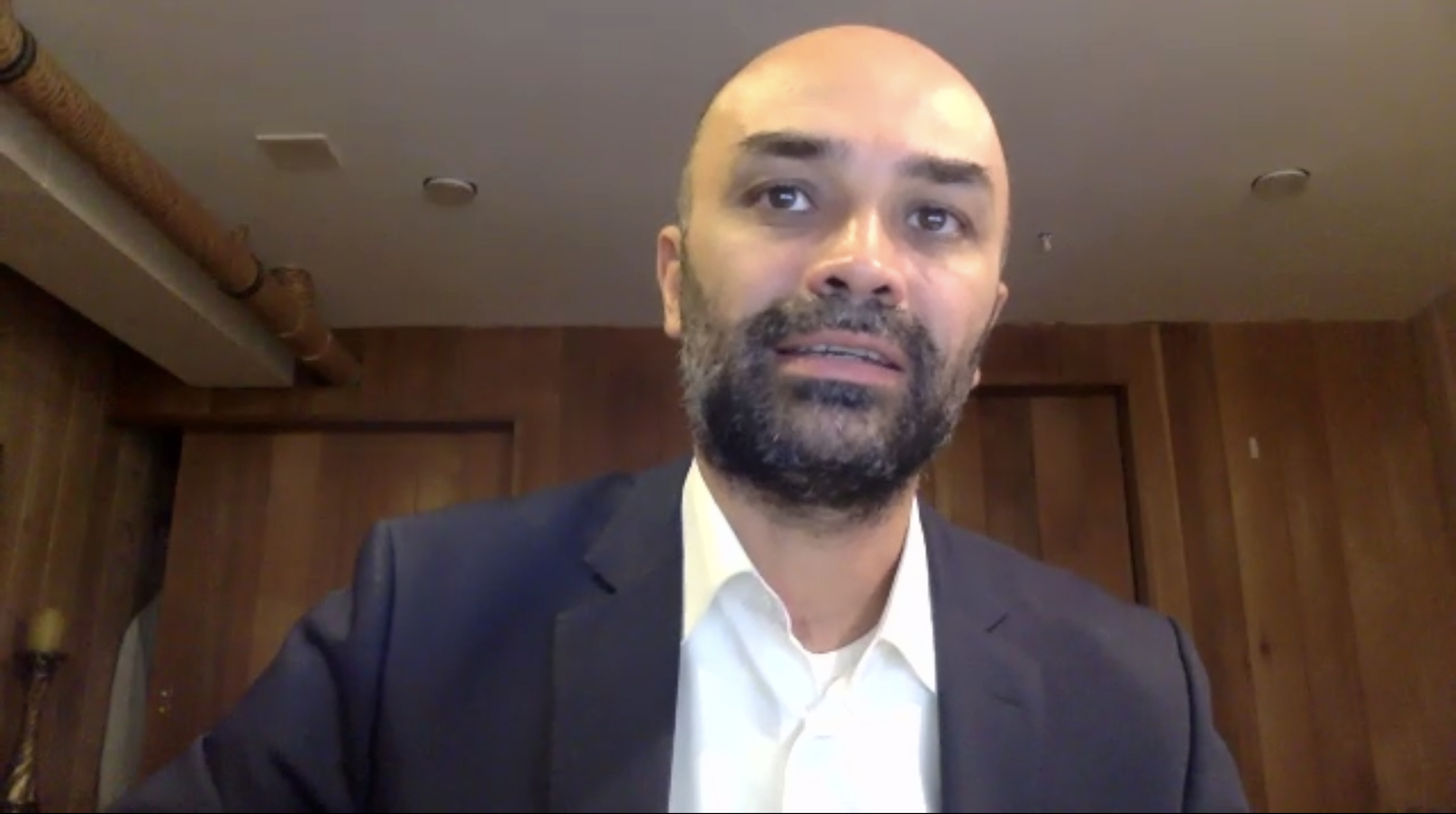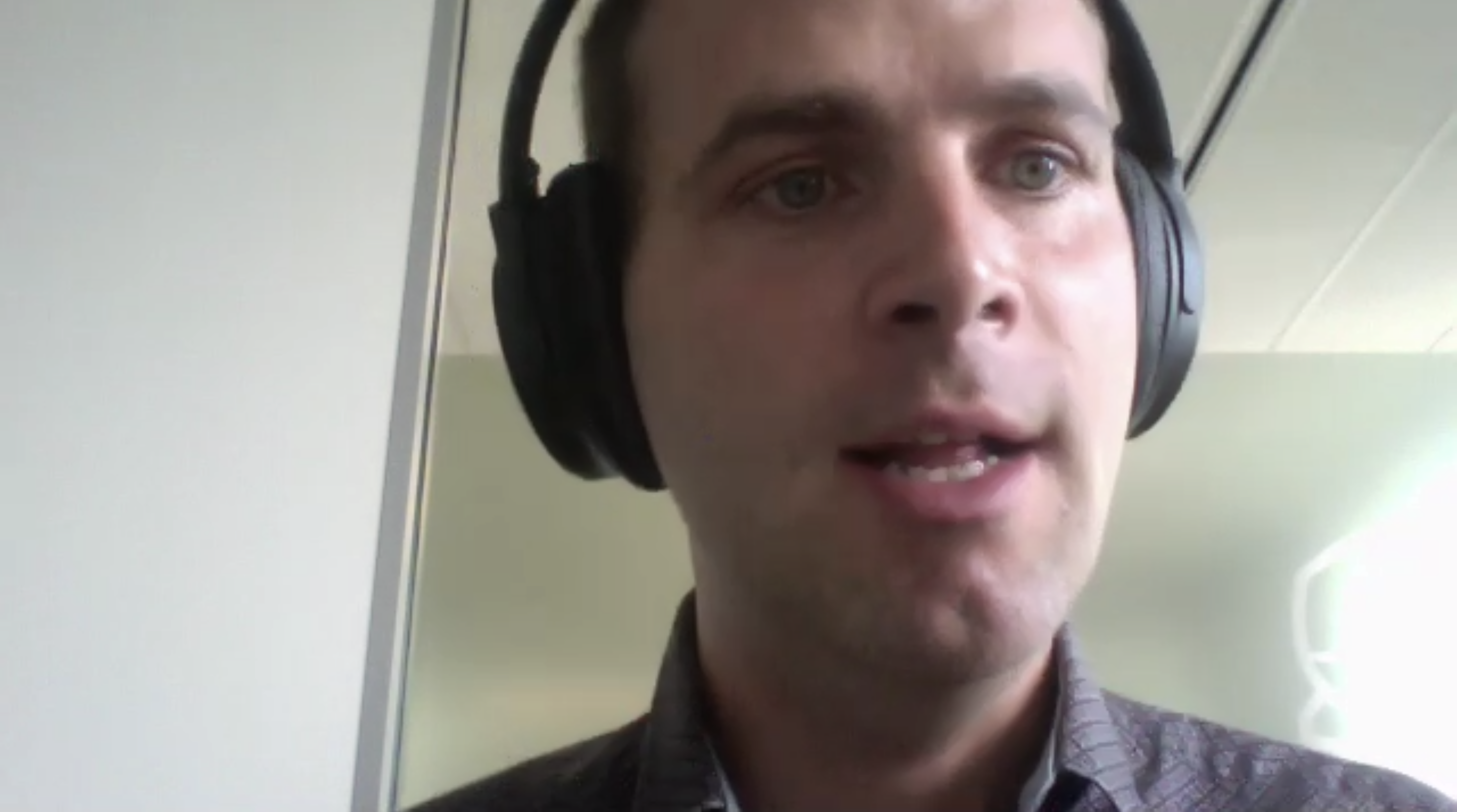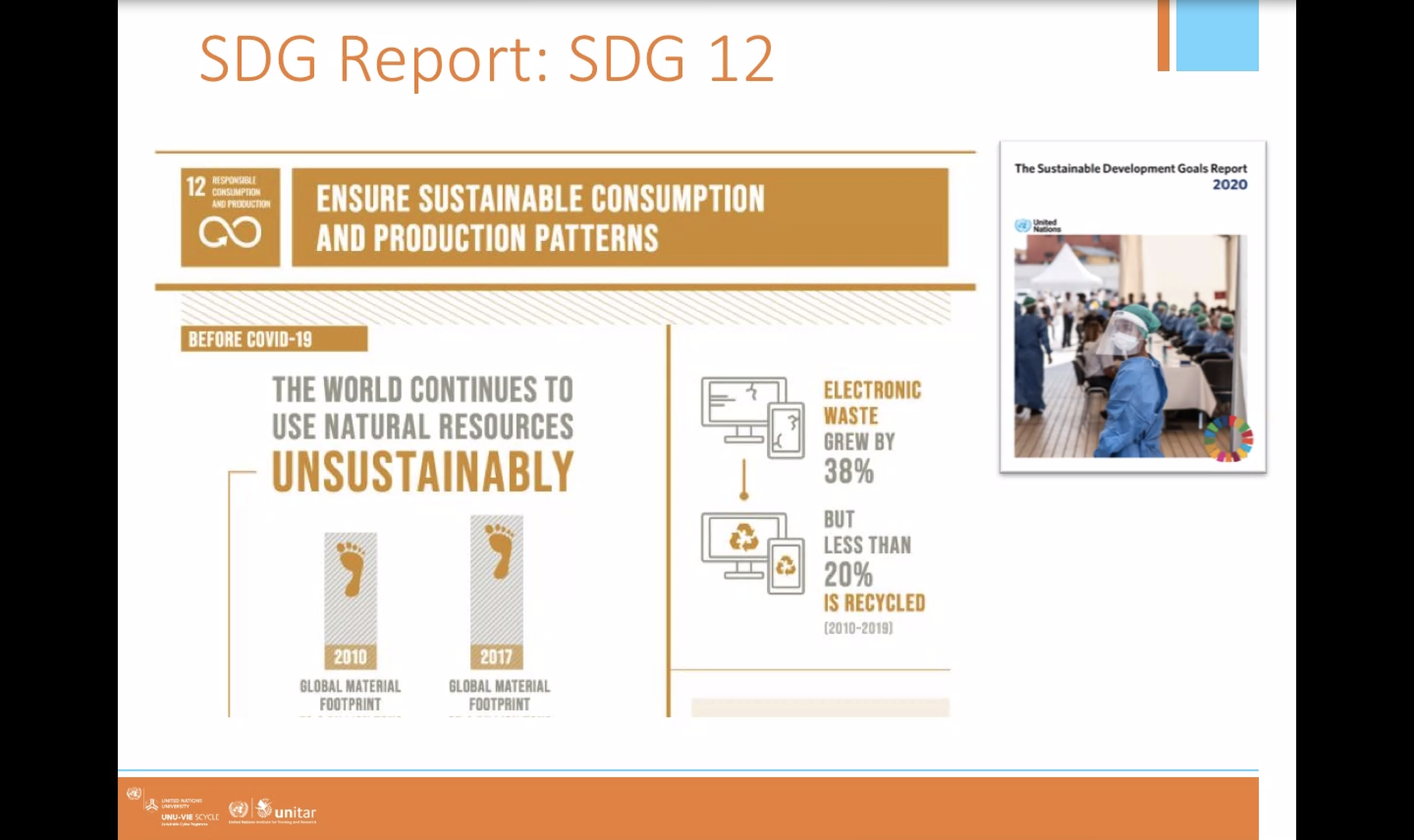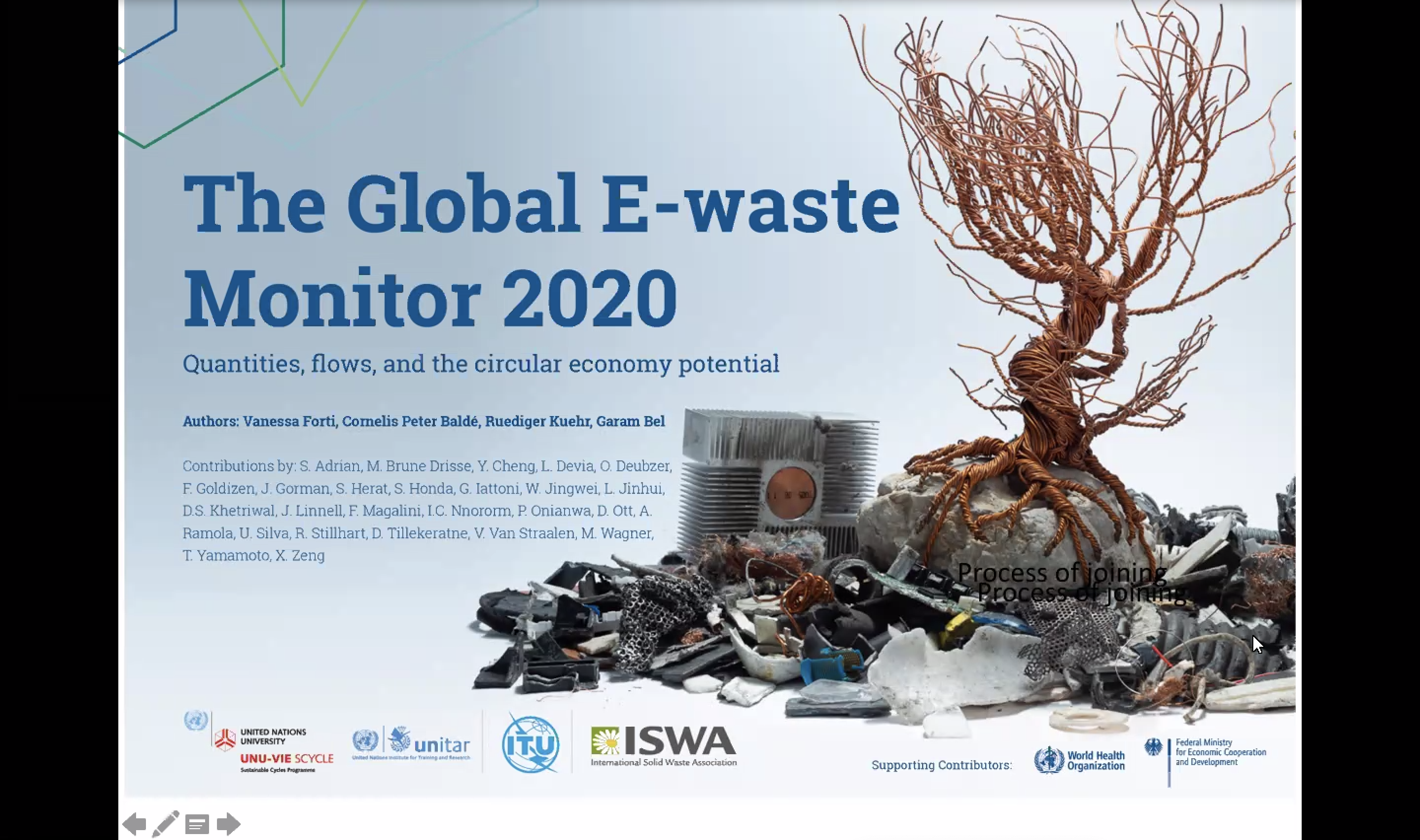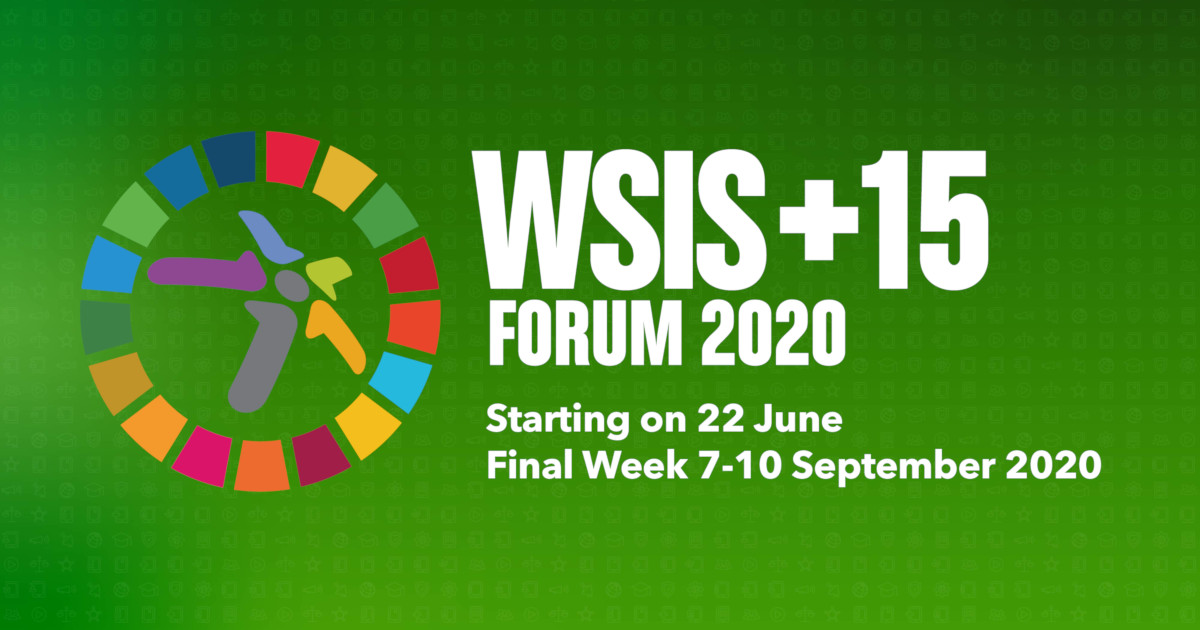Partnership on Measuring ICT for Development: Information and communication technology statistics
Partnership on Measuring ICT for Development
Session 313
The Partnership on Measuring ICT for Development is an international, multi-stakeholder initiative that was launched in 2004 to improve the availability and quality of ICT data and indicators, particularly in developing countries. The initiative is a direct response to the request made by the World Summit on the Information Society (WSIS) to produce official statistics to monitor the information society. The Partnership has guided policy makers in producing ICT statistics that are crucial to informed decision-making, including through the identification of a core list of ICT indicators and methodologies to collect these indicators.
The Partnership presented its report “Partnership on Measuring ICT for Development: Information and communication technology statistics (E/CN.3/2020/23)” at the 51st Session of the Statistical Commission that was held in New York on 3-6 March 2020. The Report introduced new indicators which reflect the latest developments in ICT adoption and use by households and individuals, and recent progress on the use of big data that can be used to measure ICT availability and use in sectors relevant to the SDGs that are not currently covered in the global SDG indicators framework. In general, there was support to the indicators presented and to the work of the Partnership from the Commission members. To see more details about the indicators, please visit: https://unstats.un.org/unsd/statcom/51st-session/documents/2020-23-ICT-EE.pdf
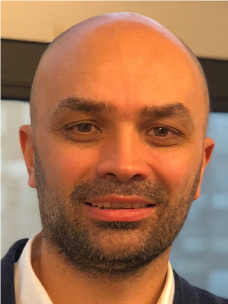
Deniz Susar is a Governance and Public Administration Officer, Digital Government Branch, Division for Public Institutions and Digital Government is a Governance and Public Administration Officer at the Division for Public Institutions and Digital Government of UNDESA. Deniz’s main work areas include digital government and preparation of the biannual UNDESA flagship publication ‘United Nations E-Government Survey'. As part of his current role, he also supports the Internet Governance Forum (IGF). HIs main research areas include e-government, open government, citizen engagement, internet governance, artificial intelligence and other frontier technologies and open government data. Deniz holds a Master Degree on International Political Economy and Development from Fordham University, New York, United States and a Computer Engineering degree from the Bosphorus University of Istanbul, Turkey.

Stephen Bereaux is the Deputy to the Director of the ITU Telecommunication Development Bureau since 7 March 2020.
Mr. Bereaux is an experienced regulator, with more than 20 years of executive and senior management experience in regulatory bodies in the Caribbean region. Prior to joining ITU, Mr Bereaux was Chief Executive Officer of the Utilities Regulation and Competition Authority (URCA), Bahamas which regulates the ICT and Electricity sectors, advises the Government on policies relating to those sectors, and represents The Bahamas at international sector related organisations such as the ITU.
Prior to joining URCA in 2010, Mr. Bereaux served in senior management roles at the Telecommunications Authority of Trinidad and Tobago (TATT) from 2004. Before becoming a Regulator, Mr. Bereaux, an Attorney by profession since 1996, practiced law at multinational firms based in London and Hong Kong, specialising in Information Technology and Telecommunications Law.
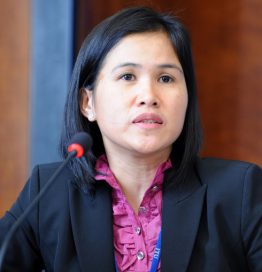
Ms Esperanza Magpantay is the Senior Statistician of the ICT Data and Analytics division of the International Telecommunication Union (ITU), where she has been working since December 2000. She is responsible for the collection, harmonization and dissemination of ICT statistics. Ms Magpantay coordinates the work of the ITU Expert Groups on ICT indicators, the ITU’s representative at the Partnership on Measuring ICT for Development and its Steering Committee, the UN Inter-agency Group on SDG indicators, and currently leads the UN Global Working Group Task Team on mobile phone big data. She has represented ITU in international and regional events giving presentations and trainings on ICT indicators.
Before joining ITU, she worked for 7 years at the International Labour Office (ILO) in Geneva as a statistical officer. She has a degree in Statistics from the University of the Philippines and is a candidate in Master in Business Analytics and Big Data from IE University in Madrid, Spain.
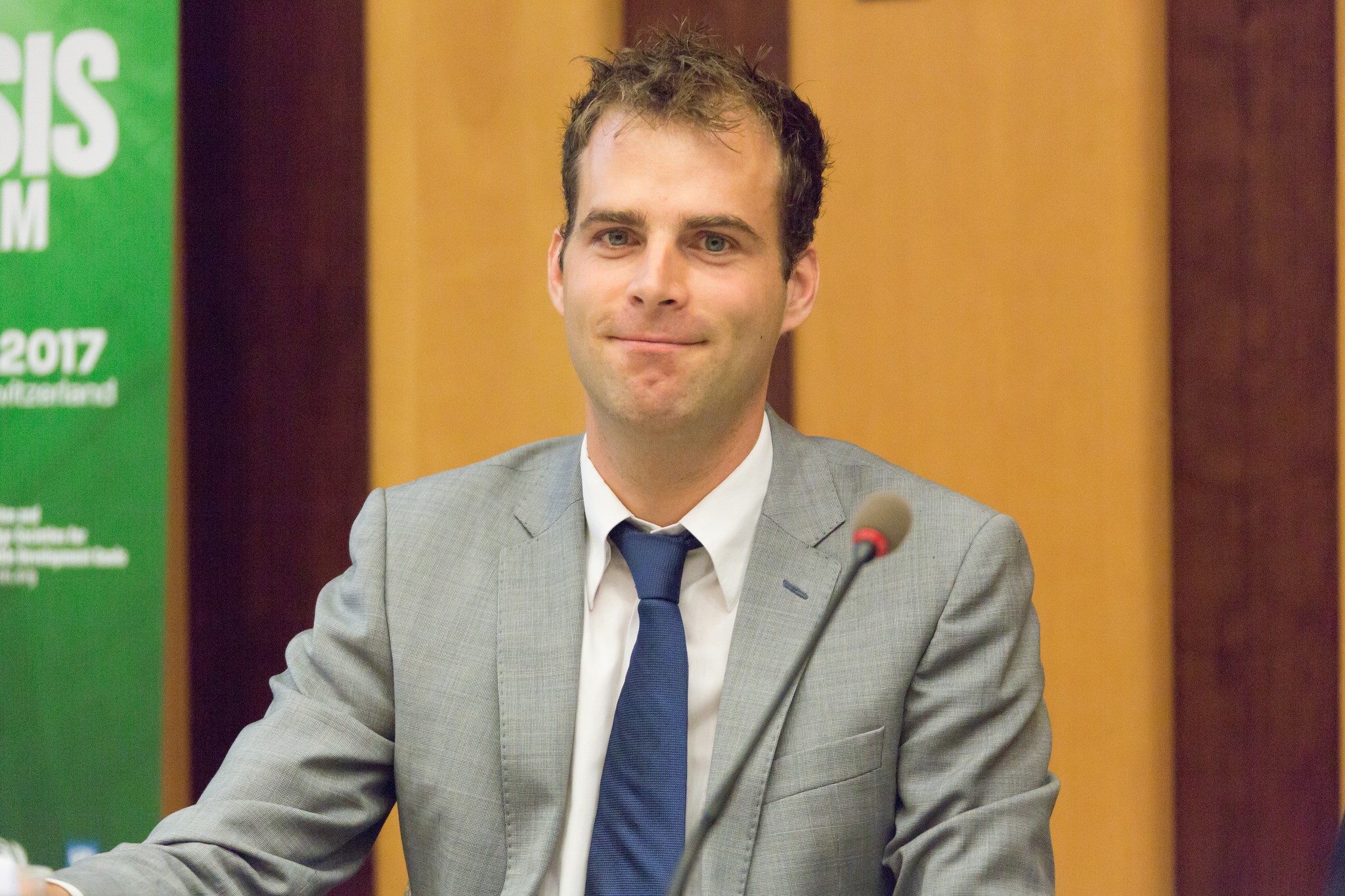
Dr. Kees Baldé is a Senior Programme Officer at the Sustainable Cycles Programme co-hosted by the United Nations Institute for Training and Research and the United Nations University. He leads the statistical work, builds capacity in countries, give policy advice to countries on e-waste. He is the lead author of the Global E-waste Monitor that he prepared together with the Global E-waste Statistics Partnership. In the EU, Kees is involved in research projects focusing on critical raw materials (e.g. PANORAMA, ORAMA and ProSUM).
He is currently the co-chair of the Taskforce on Waste Statistics of the UNECE Conference of European Statisticians that is tasked to develop a framework for waste statistics that is fit to monitor current and future (circular economy) waste policies. Next to that, Kees has been selected by the Dutch government as a member of the board of directors of the Dutch Waste Electronical and Electronic Appliances Register since 2015. In 2018, the Global e-waste monitor 2017 won the European Advanced SDG award from the Diplomatic Academy in Vienna. At Statistics Netherlands, Kees has received the Innovation Award for the Dutch Green Growth publication in 2012.
Previously, Kees worked at Statistics Netherlands, as the deputy head of the team Environment Statistics. He earned his PhD at the Faculty of Chemistry at Utrecht University on hydrogen storage.
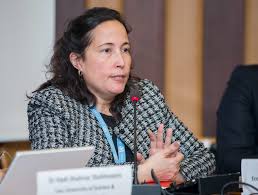
Ms. Scarlett Fondeur Gil is an Economics graduate from the Santo Domingo Institute of Technology in the Dominican Republic, with a Masters in International Relations from the University of East Anglia in the United Kingdom. She has been working for the last nine years as an Economic Affairs Officer for the ICT Analysis Section of the UN Conference on Trade and Development, UNCTAD, based in Geneva, Switzerland. She and her colleagues produce the annual Information Economy Report, which analyzes trends on ICT and the information economy in developing countries and makes policy recommendations to UNCTAD member states. She is also involved in the development of internationally comparable ICT statistics in the context of the Partnership on Measuring ICT for Development, which is composed by 13 international organizations. In this context, UNCTAD is a member of the Partnership's Task Group on E-waste measurement. UNCTAD currently collects data on the use of ICT by businesses, on the ICT sector, and on international trade in ICT goods, and aims to continue developing statistical work on measuring trade in ICT services, and gender and ICT.
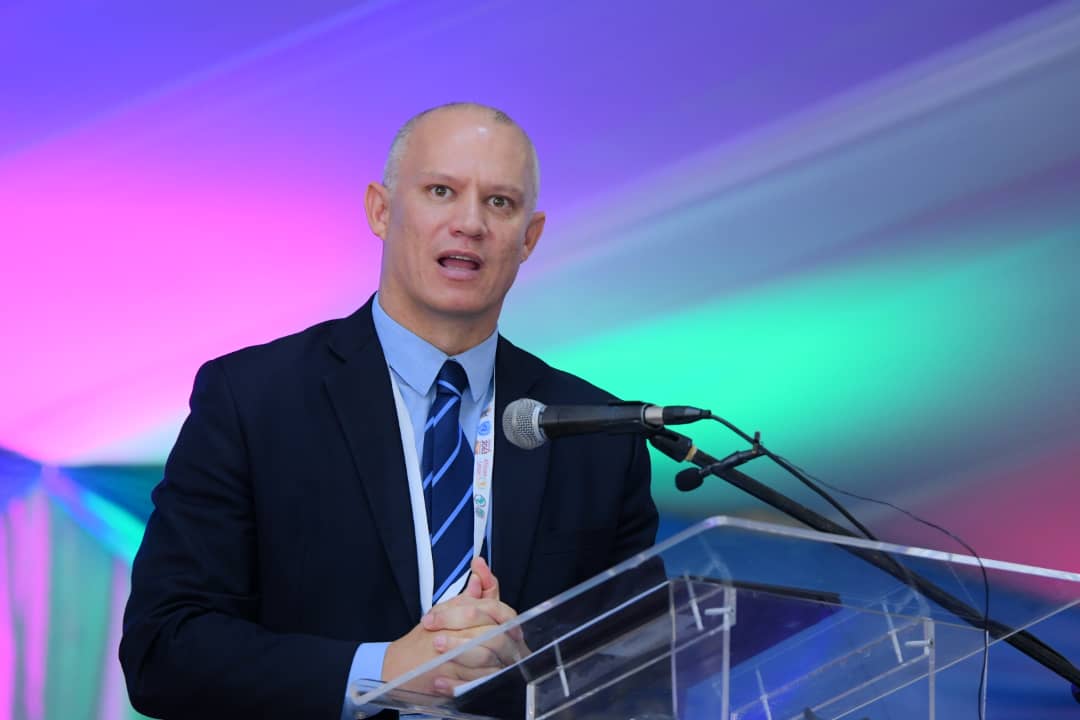
Jean-Paul Adam is the Director for Technology, Climate Change and Natural Resources Management in the United Nations Economic Commission for Africa. Prior to taking on this role, he served in the Government of the Republic of Seychelles in several Cabinet positions. He was Minister of Health from 2016 to 2019. He served as Minister of Finance, Trade and the Blue Economy from 2015 to 2016 where he negotiated a debt for climate change adaptation swap and launched the process for Seychelles to become the first issuer of a Blue Bond. Between 2010 and 2014, he was Seychelles’ Minister of Foreign Affairs, where he advocated for countries to embrace the concept of the Blue Economy, to improve sustainability for island and coastal countries. Before entering the Cabinet, between 2005 and 2009, he occupied several senior roles in the Office of the President of the Republic of Seychelles including Director General for presidential affairs, Principal Secretary for the Office of the President and Secretary of state in the presidency. He started his career as a career diplomat in the Ministry of Foreign Affairs between 2001 and 2004. He is a holder of a Masters in International Political Economy form the University of Manchester (UK) and a BA in English Literature and French from the University of Sheffield (UK).
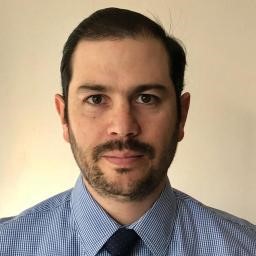
Mr. Alejandro Patino is an ICT specialist at ECLAC, he is responsible for coordinating the Digital Agenda for Latin America and the Caribbean (eLAC2018). He is co-author of several publications on digital policies, ICT statistics and open data. Part of his work at ECLAC include Science, technology and innovation in the digital economy: the situation of Latin America and the Caribbean (ECLAC, 2016), The new digital revolution: From the consumer Internet to the industrial Internet (ECLAC, 2015), Compendium of statistical practices on ICT in Latin America and the Caribbean (ECLAC, 2015). He was the Executive Director of the Agency for the Development of the Information Society in Bolivia, the manager of the country top level domain (ccTLD). He is an economist from the Instituto Tecnológico y Estudios Superiores de Monterrey (I.T.E.S.M) and holds a Master's Degree in Economics and Regulation of Public Utilities from the University of Barcelona.

Siope has more than 16 years of working experiences as a national and international civil servant on promoting sustainable development policies in the areas of international trade and telecommunications in Developing and Least Developing Countries.
During this time and in different capacities, Siope has honed his technical and managerial skills on coordinating a research team and conducting economic analyses in developing economies, particularly in Small Island Developing States (Pacific Islands), Developing countries (Asia Pacific) and Least Developed Countries (Africa). These analyses have either been published in refereed journals/chapters in books or reports by UNECA or UNESCAP.
Siope has developed econometric models (gravity-type model and efficiency-type model), and have collaborated on research papers focussing on regional trade and economic development in Africa using the GTAP model and database. Other areas of research interests include monitoring progress on sustainable development goals, telecommunications sector reform, illicit financial flows, export diversification, trade facilitation & intermediate inputs, and WTO accession.
Siope has developed project proposals and project documents and coordinated the implementation and reporting of development projects in Africa and Asia-Pacific regions respectively. Currently, Siope is working on ICT and development issues, in particular promoting affordable regional fibre-optic broadband connectivity.
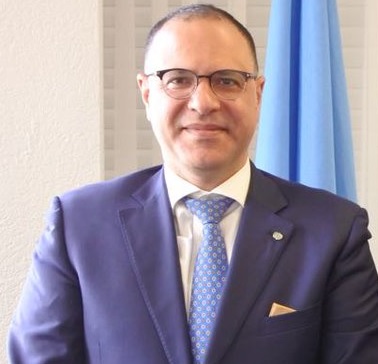
Ayman El-Sherbiny is a senior International Development and Regional integration Strategist in the UN, and a former senior executive at the CEO and Managing Director level in the ICT Sector. He has joined the UN by late 2002, and participated in establishing the ICT Division of ESCWA. By 2011, he became, he became the Chief of Information and Communication Technology Policies at the United Nations – ESCWA. He has authored tens of publications on the Information Society as well as on e-Government and Digital Economy; and has co-founded the Arab Internet Governance Forum (AIGF) and the Arab High-Level Forum on WSIS and 2030 Agenda. He’s led several international and regional initiatives and is a regular speaker in international conferences on digital oriented issues; and his current work focuses on Digital Cooperation and Development, and on the formulation of an Arab Digital Agenda and Strategy for the Arab region and for a number of Arab countries, with nexus to the 2030 Agenda.
-
 C1. The role of governments and all stakeholders in the promotion of ICTs for development
C1. The role of governments and all stakeholders in the promotion of ICTs for development
-
 C2. Information and communication infrastructure
C2. Information and communication infrastructure
-
 C3. Access to information and knowledge
C3. Access to information and knowledge
-
 C4. Capacity building
C4. Capacity building
-
 C5. Building confidence and security in use of ICTs
C5. Building confidence and security in use of ICTs
-
 C6. Enabling environment
C6. Enabling environment
-
 C7. ICT applications: benefits in all aspects of life — E-government
C7. ICT applications: benefits in all aspects of life — E-government
-
 C7. ICT applications: benefits in all aspects of life — E-business
C7. ICT applications: benefits in all aspects of life — E-business
-
 C7. ICT applications: benefits in all aspects of life — E-learning
C7. ICT applications: benefits in all aspects of life — E-learning
-
 C7. ICT applications: benefits in all aspects of life — E-health
C7. ICT applications: benefits in all aspects of life — E-health
-
 C7. ICT applications: benefits in all aspects of life — E-employment
C7. ICT applications: benefits in all aspects of life — E-employment
-
 C7. ICT applications: benefits in all aspects of life — E-environment
C7. ICT applications: benefits in all aspects of life — E-environment
-
 C7. ICT applications: benefits in all aspects of life — E-agriculture
C7. ICT applications: benefits in all aspects of life — E-agriculture
-
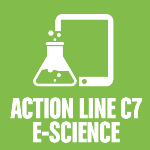 C7. ICT applications: benefits in all aspects of life — E-science
C7. ICT applications: benefits in all aspects of life — E-science
-
 C8. Cultural diversity and identity, linguistic diversity and local content
C8. Cultural diversity and identity, linguistic diversity and local content
-
 C9. Media
C9. Media
-
 C10. Ethical dimensions of the Information Society
C10. Ethical dimensions of the Information Society
-
 C11. International and regional cooperation
C11. International and regional cooperation
-
 Goal 1: End poverty in all its forms everywhere
Goal 1: End poverty in all its forms everywhere
-
 Goal 2: End hunger, achieve food security and improved nutrition and promote sustainable agriculture
Goal 2: End hunger, achieve food security and improved nutrition and promote sustainable agriculture
-
 Goal 3: Ensure healthy lives and promote well-being for all
Goal 3: Ensure healthy lives and promote well-being for all
-
 Goal 4: Ensure inclusive and equitable quality education and promote lifelong learning opportunities for all
Goal 4: Ensure inclusive and equitable quality education and promote lifelong learning opportunities for all
-
 Goal 5: Achieve gender equality and empower all women and girls
Goal 5: Achieve gender equality and empower all women and girls
-
 Goal 6: Ensure access to water and sanitation for all
Goal 6: Ensure access to water and sanitation for all
-
 Goal 7: Ensure access to affordable, reliable, sustainable and modern energy for all
Goal 7: Ensure access to affordable, reliable, sustainable and modern energy for all
-
 Goal 8: Promote inclusive and sustainable economic growth, employment and decent work for all
Goal 8: Promote inclusive and sustainable economic growth, employment and decent work for all
-
 Goal 9: Build resilient infrastructure, promote sustainable industrialization and foster innovation
Goal 9: Build resilient infrastructure, promote sustainable industrialization and foster innovation
-
 Goal 10: Reduce inequality within and among countries
Goal 10: Reduce inequality within and among countries
-
 Goal 11: Make cities inclusive, safe, resilient and sustainable
Goal 11: Make cities inclusive, safe, resilient and sustainable
-
 Goal 12: Ensure sustainable consumption and production patterns
Goal 12: Ensure sustainable consumption and production patterns
-
 Goal 13: Take urgent action to combat climate change and its impacts
Goal 13: Take urgent action to combat climate change and its impacts
-
 Goal 14: Conserve and sustainably use the oceans, seas and marine resources
Goal 14: Conserve and sustainably use the oceans, seas and marine resources
-
 Goal 15: Sustainably manage forests, combat desertification, halt and reverse land degradation, halt biodiversity loss
Goal 15: Sustainably manage forests, combat desertification, halt and reverse land degradation, halt biodiversity loss
-
 Goal 16: Promote just, peaceful and inclusive societies
Goal 16: Promote just, peaceful and inclusive societies
-
 Goal 17: Revitalize the global partnership for sustainable development
Goal 17: Revitalize the global partnership for sustainable development
